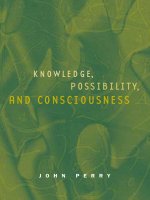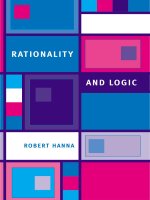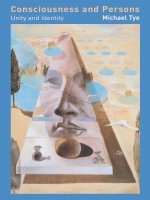the mit press coherence in thought and action nov 2000
Bạn đang xem bản rút gọn của tài liệu. Xem và tải ngay bản đầy đủ của tài liệu tại đây (867.64 KB, 329 trang )
Coherence in Thought and Action
Life and Mind: Philosophical Issues in Biology and
Psychology
Kim Sterelny and Robert A. Wilson, editors
Cycles of Contingency: Developmental Systems and
Evolution, Susan Oyama, Paul E. Griffiths, and Russell
D. Gray, editors, 2000
Coherence in Thought and Action, Paul Thagard, 2000
Coherence in Thought and Action
Paul Thagard
A Bradford Book
MIT Press
Cambridge, Massachusetts
London, England
© 2000 Massachusetts Institute of Technology
All rights reserved. No part of this book may be reproduced in
any form by any electronic or mechanical means (including pho-
tocopying, recording, and information storage and retrieval)
without permission in writing from the publisher.
This book was set Sabon by Best-set Typesetter Ltd., Hong Kong,
and was printed and bound in the United States of America.
First printing, 2000
Library of Congress Cataloging-in-Publication Data
Thagard, Paul.
Coherence in thought and action / Paul Thagard.
p. cm.—(Life and mind)
“A Bradford book.”
Includes bibliographical references and index.
ISBN 0-262-20131-3 (alk. paper)
1. Truth—Coherence theory. I. Title. II. Series.
BD 171 .T45 2000
121—dc21 00–035503
This book is dedicated to all my coherence collaborators,
especially Cam, Chris, Claire, Karsten, Keith, Lije,
Michael, and Ziva.
This page intentionally left blank
Contents
Preface xi
Acknowledgments xiii
1 Coherence in Philosophy and Psychology 1
1 Coherence in Psychology 2
2 Coherence in Philosophy 4
3 Why Philosophy Abandoned Psychology 6
4 Cognitive Naturalism 9
5 Summary 12
2 Coherence as Constraint Satisfaction 15
1 Constraint Satisfaction 16
2 Coherence Problems 20
3 Computing Coherence 25
4 Measuring Coherence 37
5 Summary 40
3 Knowledge 41
1 Haack’s “Foundherentism” and Explanatory
Coherence
42
2 Analogical Coherence 48
3 Deductive Coherence 52
4 Perceptual Coherence 57
5 Conceptual Coherence 60
6 Unifying Coherence 64
7 Objections to Coherence Theories 69
8 Language 80
9 Summary 82
4 Reality 85
1 Truth and the World 86
2 Correspondence and Approximate Truth 90
3 Mind and Body 94
4 Other Minds 102
5 God 109
6 Summary 117
7 Appendix: The Comparative Coherence of
Materialism, Dualism, and Theism
118
5 Ethics and Politics 125
1 Deliberative Coherence 127
2 Deductive Coherence 132
3 Explanatory Coherence 135
4 Analogical Coherence 137
5 Making Sense of Ethics 140
6 Putting It All Together 142
7 The Coherence of Abortion 144
8 Normative Issues 146
9 Politics: Justifying the State 148
viii CONTENTS
10 What Kind of State? 154
11 Conclusion 161
12 Summary 164
6 Emotion 165
1 The Importance of Trust 165
2 Coherence-Based Inference 167
3 Emotional Coherence: Theory 170
4 Emotional Coherence: Model 172
5 Emotional Coherence and Trust 177
6 Empathy 183
7 Nationalism 187
8 Metacoherence 193
9 Beauty and Symmetry 199
10 Humor 204
11 Cognitive Therapy 208
12 Evidence for Emotional Coherence Theory 211
13 Normative Considerations 214
14 Summary 220
7 Consensus 223
1 Consensus in Science and Medicine 224
2 A Model of Consensus 225
3 Consensus and the Causes of Ulcers 230
4 Consensus and the Origin of the Moon 237
5 Benefits of Consensus Conferences 238
6 Consensus in Value Judgments 241
7 Summary 243
ix CONTENTS
8 Probability 245
1 Two Traditions in Causal Reasoning 245
2 Probabilistic Networks 250
3 Translating ECHO into Probabilistic Networks 257
4 Tackling Probabilistic Problems with ECHO 266
5 Conclusion 271
6 Summary 273
9 The Future of Coherence 275
References 287
Index 305
x CONTENTS
Preface
This book is an essay on how people make sense of each
other and the world they live in. Making sense is the activ-
ity of fitting something puzzling into a coherent pattern of
mental representations that include concepts, beliefs, goals,
and actions. I propose a general theory of coherence as the
satisfaction of multiple interacting constraints and show
that the theory has numerous psychological and philo-
sophical applications. Much of human cognition can be
understood in terms of constraint satisfaction as coher-
ence, and many of the central problems of philosophy can
be given coherence-based solutions.
Chapter 1 outlines the importance of the concept of
coherence for philosophy and psychology and proposes
cognitive naturalism as a unified approach to answering
philosophical and psychological questions. Chapter 2
develops the cognitive theory of constraint satisfaction as
coherence. Chapters 3 and 4 address important philo-
sophical problems concerning the nature of knowledge and
reality. Justification of our claims to knowledge is based on
five kinds of coherence: explanatory, conceptual, analogi-
cal, deductive, and perceptual. These also provide the
means to evaluate claims about the nature of reality, for
example concerning the existence of the external world,
other minds, and God.
Chapter 5 shows the relevance of coherence to philo-
sophical and psychological problems in ethics and politics,
arguing that ethical and political judgments are appraisals
based on deliberative coherence as well as on the kinds of
coherence described in chapter 3. Such appraisals concern
not only what to believe, but also what to do, and hence
address coherence in action as well as thought. Chapter 6
proposes a new theory of emotional coherence, according
to which our appraisals of people, things, and actions
emerge from judgments of coherence. It also contends that
beauty in science and art is a matter of emotional coher-
ence. Chapter 7 discusses how people who disagree about
scientific and other issues can form a consensus on the
basis of coherence and communication. Chapter 8 con-
trasts the coherentist approach to causal inference with
probabilistic approaches, particularly Bayesian networks.
Finally, chapter 9 suggests some directions for future
research on how ideas if about coherence can contribute
to progress in philosophy and psychology.
The result, I hope, is a highly coherent theory of
coherence. Here briefly is what the book aims to do:
•
Provide a far more general and precise account of
coherence than has previously been available.
•
Increase understanding of how human minds make sense
of the way the world is and what to do in it.
•
Develop coherence-based answers to central problems in
epistemology, metaphysics, ethics, politics, and aesthetics.
•
Use ideas about coherence to unify philosophical and
psychological problems and to integrate cognition and
emotion.
•
Understand how consensus can be reached, and identify
why it is often difficult to achieve.
•
Explain the relation between coherence and probabilis-
tic reasoning.
I hope it all makes sense.
xii PREFACE
Acknowledgments
For research support I am very grateful to the Killam Fel-
lowship program of the Canada Council and the Natural
Sciences and Engineering Research Council of Canada. I
am also indebted to the many people who have helped me
develop ideas about coherence, including Toby Donaldson,
Chris Eliasmith, Nina Gandhi, David Gochfeld, Gilbert
Harman, Keith Holyoak, Kim Honeyford, Steve Kim-
brough, Walter Kintsch, Ziva Kunda, Elijah Millgram,
Greg Nelson, Josef Nerb, Greg Nowak, Claire O’Loughlin,
Michael Ranney, Steve Roehrig, Paul Rusnock, Patricia
Schank, Cameron Shelley, Miriam Solomon, and Karsten
Verbeurgt. I am particularly grateful to Keith Holyoak,
Elijah Millgram, Michael Ranney, and Cameron Shelley for
valuable comments on a previous draft of the whole book.
Thanks to Alan Thwaits for editorial assistance.
For various chapters of this book, I have adapted parts
of the following articles:
Thagard, P. (1998). Ethical coherence. Philosophical
psychology 11: 405–422. Reprinted with permission of
Carfax Publishing Company. Appears in chap. 5.
Thagard, P. (2000). Probabilistic networks and explana-
tory coherence. Cognitive Science Quarterly 1: 91–114.
Reprinted with permission of Hermes Science Publishing.
Appears in chap. 8.
Thagard, P., Eliasmith, C., Rusnock, P., and Shelley, C. P.
(forthcoming). Knowledge and coherence. In R. Elio (ed.),
Common sense, reasoning, and rationality (vol. 11). New
York: Oxford University Press. Appears in chap. 3.
Thagard, P., and Kunda, Z. (1998). Making sense of
people: coherence mechanisms. In S. J. Read and L. C.
Miller (eds.), Connectionist models of social reasoning and
social behavior (pp. 3–26). Hillsdale, N.J.: Erlbaum.
Reprinted with permission of Lawrence Erlbaum Associ-
ates. Appears in chap. 4.
Thagard, P., and Verbeurgt, K. (1998). Coherence as con-
straint satisfaction. Cognitive Science 22: 1–24. Reprinted
with permission of the Cognitive Science Society. Appears
in chaps. 2, 3.
xiv ACKNOWLEDGEMENTS
Coherence in Thought and Action
This page intentionally left blank
1 Coherence in Philosophy and Psychology
At the start of the twentieth century, the disciplines of psy-
chology and philosophy were beginning to separate from
each other. Originating in the laboratories of Wilhelm
Wundt and William James in the 1870s, experimental
psychology had grown rapidly in Germany and the United
States. Whereas physics became an experimental subject in
the 1600s, it took several more centuries before the inves-
tigation of mind also became experimental. The nature and
operation of mind had been a central concern of philoso-
phers since Plato, and philosophers should have been
excited by the eruption of empirical information. Instead,
philosophy went its own way, distancing itself from exper-
imental studies of mind and denying their relevance to
traditional problems such as the nature of inference and
knowledge.
The two main movements of twentieth century phi-
losophy, analytic philosophy and phenomenology, were
explicitly antipsychological. Analytic philosophy became
dominant in English-speaking countries, establishing a
methodology that emphasized logical or linguistic con-
ceptual analysis as central to philosophical investigation
and pushing the study of mind into the background. In
Germany and later in France, the philosophical approach
of phenomenology, originated by Husserl, set itself the task
of describing phenomena of conscious experience in order
to grasp their ideal meaning. Both analytic philosophy and
phenomenology clearly separate philosophy from empiri-
cal psychology, establishing philosophy as a conceptual,
nonempirical enterprise.
Although analytic philosophy and phenomenology are
still widely practiced and taught, intellectually they have
fallen on hard times in recent decades. Both have declined
into focusing on internal puzzles and historical retrospec-
tives. In contrast, philosophy of mind and allied areas have
been reenergized by regaining contact with empirical psy-
chology, particularly with cognitive psychology, which
began to supersede behaviorism in the mid 1950s. Cogni-
tive science has emerged as the interdisciplinary study of
mind and intelligence, embracing artificial intelligence,
linguistics, anthropology, and neuroscience, as well as psy-
chology and philosophy. Now, at the beginning of a new
century, it is clear that psychology and philosophy have
many fruitful interconnections.
This book explores one such interconnection involv-
ing the role of coherence in thought. I use a computational
theory of coherence to illuminate both the psychological
task of understanding human thinking and the philosoph-
ical task of evaluating how people ought to think. The
purpose of this introductory chapter is to explain why
coherence is a crucial concept for both philosophy and psy-
chology, and to outline the view I call cognitive natural-
ism, which embraces the symbiosis of psychology and
philosophy.
1 COHERENCE IN PSYCHOLOGY
People frequently make inferences about what to believe
and what to do. Suppose you are trying to decide whether
to buy a used car from someone. You need to be able to
2 CHAPTER ONE
infer whether the car is in good condition, partly by relying
on your own observations and partly by relying on what
the seller says about the car’s history, maintenance, and
repair records. Whether you believe the seller depends on
how trustworthy he or she seems to be, which depends on
the inferences you make concerning what kind of person
the seller is and whether he or she is telling the truth in
this instance. On the traditional account of inference that
has been with us since Aristotle, your inferences are a series
of steps, each with a conclusion following from a set of
premises. Part of your chain of inference might be some-
thing like this: The seller looks honest. So the seller is
honest. So what the seller says is true. So the car is reli-
able. So I will buy it.
Another view of inference understands it differently,
not as the sort of serial, conscious process just described,
but as a largely unconscious process in which many pieces
of information are combined in parallel into a coherent
whole. On this view, your inference about the car and its
seller is the result of mentally balancing many comple-
mentary and conflicting pieces of information until they all
fit together in a satisfying way. The result is a holistic judg-
ment about the nature of the car, the nature of the seller,
and whether to buy the car. Such judgments are the result
of integrating the diverse information you have to deal
with into a coherent total package. Whether you believe
what the seller says about the car will depend in part on
what you can infer about the car and vice versa.
Talk of holism and coherence might sound rather mys-
tical, but I am not proposing a kind of New Age cognitive
psychology. As chapter 2 describes, coherence-based infer-
ence can be characterized just as rigorously as traditional,
logic-based inference. Moreover, much of human thinking
is naturally understood as coherence-based, in domains as
diverse as social impression formation, scientific-theory
3 COHERENCE IN PHILOSOPHY AND PSYCHOLOGY
choice, discourse comprehension, visual perception, and
decision making. Later chapters will show how these and
other kinds of human thinking can be understood in terms
of coherence processes. A precise and psychologically plau-
sible theory of coherence has much to contribute to cog-
nitive, social, and developmental psychology. One benefit,
described in chapter 6, is a unified account of cognition
and emotion.
2 COHERENCE IN PHILOSOPHY
Philosophy differs from psychology in that it is tradition-
ally concerned with normative questions about how people
should think, not just descriptive questions about how they
do think. At the center of this normative concern is justi-
fication: are we justified in having the beliefs that we have
acquired, and how can we justify the acquisition of new
beliefs? For many philosophers, justification is a matter of
finding the right foundation consisting of a set of indu-
bitable beliefs from which other beliefs can be inferred.
Two sources of certainty have been pursued: reason and
sense experience. Rationalists such as Plato and Descartes
attempted to use reason alone to achieve foundations
of knowledge that could provide sources of justification
for other beliefs. In contrast, empiricists such as Locke,
Berkeley, and Hume took sense experience as the foun-
dation for all knowledge.
Today, it is generally recognized that both of these
foundational approaches to justification are failures. There
are no indubitable truths of reason of the sort that Plato
and Descartes sought, and even if there were, they would
be too trivial to provide a basis for all the other things we
think we know. Similarly, there are no indubitable truths
of sense experience, and sense experience alone is too
4
CHAPTER ONE
meager a foundation for the rich theoretical knowledge we
achieve in science and everyday life. Rationalism and
empiricism are both defective theories of knowledge.
The failure of foundational epistemologies has
impelled many philosophers, including Hegel (1967),
Bradley (1914), Bosanquet (1920), Neurath (1959), Quine
(1963), BonJour (1985), and Harman (1986), to pursue an
account of justification in terms of coherence. Our knowl-
edge is not like a house that sits on a foundation of bricks
that have to be solid, but more like a raft that floats on the
sea with all the pieces of the raft fitting together and sup-
porting each other. A belief is justified not because it is
indubitable or is derived from some other indubitable
beliefs, but because it coheres with other beliefs that jointly
support each other. Coherentist justification applies not
only to particular beliefs, but also to the justification of
particular kinds of deductive and inductive inference
(Goodman 1965), and to the justification of ethical prin-
ciples on the basis of how well they fit with ethical judg-
ments and background knowledge (Rawls 1971). To justify
a belief, inferential practice, or ethical principle, we do not
have to build up from an indubitable foundation; rather
we merely have to adjust our whole set of beliefs, prac-
tices, and principles until we reach a coherent state that
Rawls calls reflective equilibrium.
Coherentist justification of this sort is much more
promising than the foundationalist approach, but there
is also something philosophically unsatisfying about it.
In contrast to the neat Euclidean picture of foundational
axioms yielding a set of fully justified axioms, we have
vague talk of everything fitting together. What does it
mean for a belief or practice or principle to be part of the
maximally coherent set? How is coherence maximized?
The term “reflective equilibrium” is apt for describing
a state in which the maximally coherent state has been
5 COHERENCE IN PHILOSOPHY AND PSYCHOLOGY
achieved, but it provides no insight on how to achieve
it.
Chapter 2 provides a much more precise account of
coherence as constraint satisfaction, along with algorithms
for computing coherence. Later chapters show how differ-
ent kinds of coherence, employing different kinds of rep-
resentations and constraints, cover the most important
areas of philosophical thought. My aim, however, is not
just to describe the logic of coherence, but to give a psy-
chologically plausible account of how coherence mecha-
nisms operate in the human mind. A computational and
naturalistic account of coherence can help not only with
traditional philosophical problems of justification, but also
with psychological concerns about how the mind works.
Before undertaking that task, however, some preliminary
remarks about the relation of philosophy and psychology
are in order.
3 WHY PHILOSOPHY ABANDONED PSYCHOLOGY
It is commonly believed that in the nineteenth century
psychology emerged from philosophy, just as physics,
chemistry, and biology had earlier used experimental
methods to develop beyond philosophical speculation. In
contrast, Reed (1997) argues that it is more accurate to say
that philosophy emerged from psychology. The history of
philosophy before 1900 is dominated by figures who
approached epistemological and metaphysical issues in
tandem with questions concerning the nature of mind:
Plato, Aristotle, Descartes, Hobbes, Locke, Berkeley,
Hume, Kant, and Mill, to name just a few. For these
thinkers, philosophy and psychology clearly were not sep-
arate disciplines. Similarly for the founders of experimen-
6 CHAPTER ONE
tal psychology such as Wundt and James, philosophy and
psychology were intimately connected. The connection
was broken by the development of schools of philosophy
that were explicitly antagonistic to any influence of
empirical psychology on philosophy.
The two most influential approaches to philosophy in
the twentieth century, analytic philosophy and phenome-
nology, were both formed in reaction to a view disparaged
as psychologism. Through the influence of Frege and
Russell, formal logic became established as a philosophi-
cal tool viewed as much superior to psychology for the
understanding of inference and the structure of knowledge.
Husserl, the founder of phenomenology, began his career
discussing the nature of mathematical knowledge in the
philosophical/psychological tradition of Brentano, but
quickly shifted, partly as a result of Frege’s criticisms, to
an a priori, nonexperimental investigation of conscious-
ness. Thus the emergence of antipsychologism in
twentieth-century philosophy was actually a break with
much of the previous history of the subject.
Why did philosophers make this break? It would be
superficial to give a purely sociological explanation,
although there certainly were concerns among philoso-
phers that their power and influence were waning in com-
parison to the emerging psychologists. In the United States,
the American Philosophical Association was formed after
the American Psychological Association, and specialty
philosophical journals such as Philosophical Review were
started years after the American Journal of Psychology
(Wilson 1990). Philosophers in German universities circu-
lated a petition in 1913 to urge that the growing practice
of appointing psychologists to philosophy professorships
be stopped (Ash 1995, Kusch 1995). Institutionally,
philosophers were undoubtedly threatened by the growth
7 COHERENCE IN PHILOSOPHY AND PSYCHOLOGY
of experimental psychology, but there are deeper, more
conceptual explanations of why philosophy became
antipsychological.
For both Frege and Husserl, avoiding psychology was
essential for establishing objective truths. Frege’s Basic
Laws of Arithmetic, published in 1893, began with a dia-
tribe against what he called the “psychological logicians,”
whom he accused of writing logic books that are “bloated
with unhealthy psychological fat that conceals all more
delicate forms” (Frege 1964, 24). On his view, “the laws
of truth are not psychological laws: they are boundary
stones set in an eternal foundation, which our thought can
overflow, but never displace” (1964, 13). Knowledge of
arithmetic has nothing to do with psychology, Frege
claimed, but is purely a matter of logic. Similarly, Husserl
in 1913 made a sharp distinction between psychology
and his enterprise of “pure phenomenology,” which he
intended to establish “not as a science of facts, but as a
science of essential Being,” leading the way to “Absolute
Knowledge” (Husserl 1962, 40–41). Logical and phenom-
enological approaches both promised to provide phi-
losophy with a priori knowledge, which no work tainted
with empirical psychology could achieve.
The decades have not been kind to either of these
ambitious enterprises. Gödel showed in 1931 that logic
was insufficient for the foundations of arithmetic, and
indubitable a priori truths of the sort sought by Frege,
Husserl, and many other philosophers have been elusive.
At best, the only defensible a priori truths are trivialities
such as “Not every statement is both true and false”
(Putnam 1983). The search for solid foundations for
knowledge has undoubtedly failed, and this failure has
cast some philosophers into the desperate postmodern
conclusion that philosophy is dead and that nothing
survives but discourse about discourse. Such despair is
8
CHAPTER ONE









